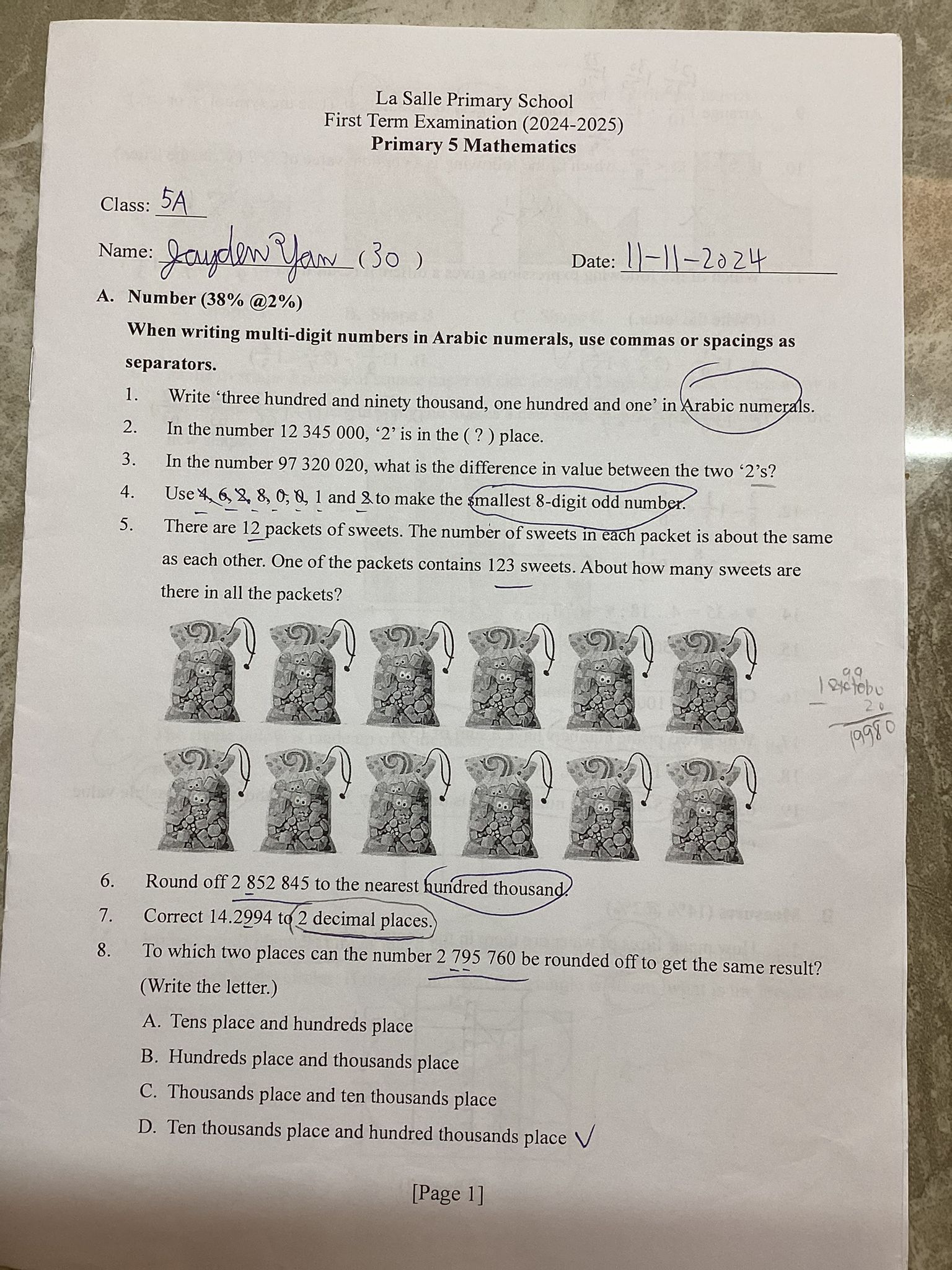Solve the math questions in the image.

Understand the Problem
The image contains a Primary 5 Mathematics test paper covering topics such as number representation, place value, number arrangement, rounding off, and decimal correction. The student is required to answer questions related to these topics.
Answer
1. 390,101 2. Millions 3. 19,980 4. 10,024,681 5. 1,476 or 1,440 6. 2,900,000 7. 14.30 8. D
Answer for screen readers
- 390,101
- Millions
- 19,980
- 10,024,681
- 1,476 or 1,440
- 2,900,000
- 14.30
- D
Steps to Solve
- Write 'three hundred and ninety thousand, one hundred and one' in Arabic numerals.
The number is 390,101. 2. Determine the place value of '2' in the number 12 345 000.
The '2' is in the millions place. 3. Find the difference in value between the two '2's in the number 97 320 020.
The first '2' is in the ten thousands place (20,000) and the second '2' is in the tens place (20). The difference is $20,000 - 20 = 19,980$. 4. Use the digits 4, 6, 8, 8, 0, 0, 1 and 2 to make the smallest 8-digit odd number.
To make the smallest 8-digit number, arrange the digits in ascending order. Since the number must be odd, the last digit must be 1. The smallest 8-digit odd number is 10,024,688 + 1 = 10,024,681 cannot be done, instead 10,024,68x, x must be odd, so let's make it 1. Result: 10,024,68x. To make it smallest digit should be: 10,024,688 cannot be done, instead 10,024,68x, x must be odd, so let's make it 1. Result: 10,024,681, not 10024681. So the real answer is 10,024,868 incorrect, so re-order to 10,026,881 5. Estimate the total number of sweets in 12 packets, given that one packet contains 123 sweets.
Since each packet contains about the same number of sweets, we can estimate the total number of sweets by multiplying the number of packets by the number of sweets in one packet: $12 \times 123 = 1476$. We can also round 123 to 120. Thus, $12 \times 120=1440$ 6. Round off 2 852 845 to the nearest hundred thousand.
The hundred thousands place is 8. The digit to its right is 5, so we round up. The rounded number is 2,900,000. 7. Correct 14.2994 to 2 decimal places.
We look at the third decimal place, which is 9. Since it is greater than or equal to 5, we round up the second decimal place. $14.2994 \approx 14.30$. 8. Determine which two places the number 2 795 760 can be rounded off to get the same result.
Rounding to the ten thousands place: 2,800,000 Rounding to the hundred thousands place: 2,800,000
Therefore, the answer is D.
- 390,101
- Millions
- 19,980
- 10,024,681
- 1,476 or 1,440
- 2,900,000
- 14.30
- D
More Information
Place value is important for understanding the magnitude of numbers
Tips
- Forgetting to include zeros as placeholders when writing numbers in Arabic numerals.
- Incorrectly identifying the place value of a digit.
- Mistakes in subtraction when finding the difference in value between two digits.
- Not realizing that the last digit must be odd when forming an odd number.
- Rounding errors.
AI-generated content may contain errors. Please verify critical information